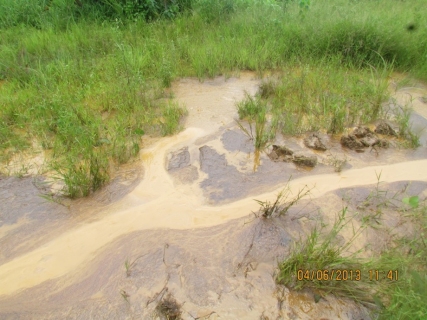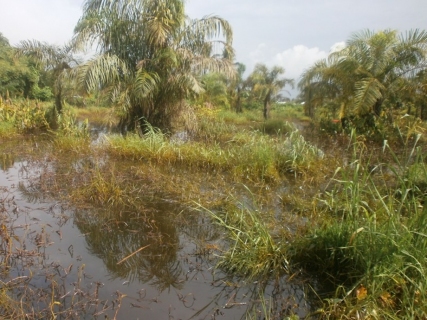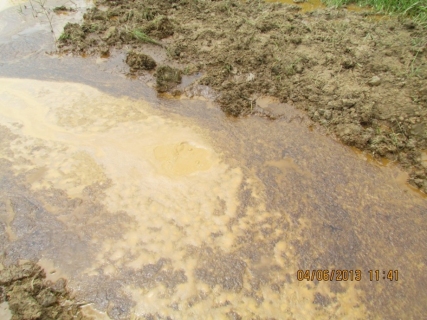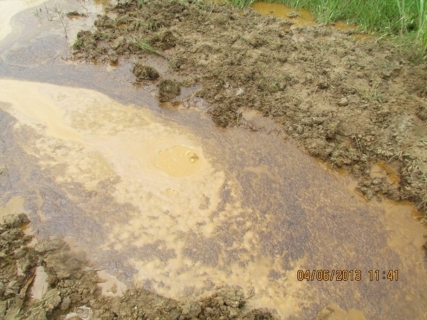Among the various types of “leaks” followers of
mainstream international media have had their consciousness inundated
with in the last few weeks, crude oil leaks have seen little prime time
attention despite their high incidences and massive human impact in the
Niger delta region of Nigeria. One such leak occurred recently, a result
of damage to an oil pipeline in Ikarama, Bayelsa State, Nigeria.
On June 4 of this year, a Shell Petroleum DevelopmentCompany (SPDC) oil pipeline running through the area has ruptured, according to a report and photographs from Environmental Rights Action/Friends of the EarthNigeria (ERA/FoEN), spewing the oil into the area in large amounts into nearby Taylor Creek, the main local water supply, as well as farms, marshes, ponds, and homes were all impacted.
The incident is not the first to affect the area, in fact, ERA/FoEN reported a similar incident in 2011, which was only magnified in intensity by the fact that the contents of that leak were set ablaze, damaging property and homes.
Residents of the area, angered that this has happened yet again, sounded off to ERA/FoEN about the event.
“We that are living so close will suffer the consequence again; my children fell sick last time. Even now they have not fully recovered,” Patience Roland shares. “My twins are just about three months of age, and you can imagine the risk of living within this immediate environment highly impacted by crude oil again.”
Public-relations Officer of the Ikarama Community Development Committee, Washington Odoyibo, also expressed anger, stating, “my anger stems from the fact that our community will not benefit any positive outcome from such spills occasioned by third party activity.” Odoyibo, incensed about the environmental detriment caused by the “countless” spills, was personally impacted by the leak, as oil spilled from the pipeline flowed into a swamp and onto his land.
“This is about the 3rd or 4thtime that swamps are being impacted; wasted,” he followed up. “We used to fish in that swamp from time to time. But these oil spills would not allow us to use it anymore.” Odoyibo also details the cleanup of the leak, claiming it took Shell 5 days to come and clean up the mess. During that time, ERA/FoEN observed that the spill covered over the size of a “football field”, and had blackened since it is exposure and contact with the swamp.
“An estimated volume of some hundreds of barrels of crude oil must have been spewed into this environment,” ERA/FoEN observed. “ERA’s field monitors observed that the current spill happened within the community; not in the bush or other isolated environment,” the ERA/FoEN observation continued. ERA/FoEN concluded their analysis with four demands for Shell, which are listed below. 1.Shell should mobilize to the site immediately to mop up, cleanup and remediate the impacted environment. 2.The relevant agencies of government should step in to ensure that this impacted environment is properly mopped up and cleaned.
3.Shell should look inwards to identify staff/contractors who sponsor cases of sabotage and bring an end to the series of spill in Ikarama and environs. 4.Community folks should resist the temptation to engage in acts of sabotage and save themselves and their environment of pollution. CitingShell’s principle of corporate social responsibility, ERA concluded the report with this: “The issue of security of oil facilities, negligence and responsibility should be viewed critically in oil spill incidents, especially in cases of this nature.”

















On June 4 of this year, a Shell Petroleum DevelopmentCompany (SPDC) oil pipeline running through the area has ruptured, according to a report and photographs from Environmental Rights Action/Friends of the EarthNigeria (ERA/FoEN), spewing the oil into the area in large amounts into nearby Taylor Creek, the main local water supply, as well as farms, marshes, ponds, and homes were all impacted.
The incident is not the first to affect the area, in fact, ERA/FoEN reported a similar incident in 2011, which was only magnified in intensity by the fact that the contents of that leak were set ablaze, damaging property and homes.
Residents of the area, angered that this has happened yet again, sounded off to ERA/FoEN about the event.
“We that are living so close will suffer the consequence again; my children fell sick last time. Even now they have not fully recovered,” Patience Roland shares. “My twins are just about three months of age, and you can imagine the risk of living within this immediate environment highly impacted by crude oil again.”
Public-relations Officer of the Ikarama Community Development Committee, Washington Odoyibo, also expressed anger, stating, “my anger stems from the fact that our community will not benefit any positive outcome from such spills occasioned by third party activity.” Odoyibo, incensed about the environmental detriment caused by the “countless” spills, was personally impacted by the leak, as oil spilled from the pipeline flowed into a swamp and onto his land.
“This is about the 3rd or 4thtime that swamps are being impacted; wasted,” he followed up. “We used to fish in that swamp from time to time. But these oil spills would not allow us to use it anymore.” Odoyibo also details the cleanup of the leak, claiming it took Shell 5 days to come and clean up the mess. During that time, ERA/FoEN observed that the spill covered over the size of a “football field”, and had blackened since it is exposure and contact with the swamp.
“An estimated volume of some hundreds of barrels of crude oil must have been spewed into this environment,” ERA/FoEN observed. “ERA’s field monitors observed that the current spill happened within the community; not in the bush or other isolated environment,” the ERA/FoEN observation continued. ERA/FoEN concluded their analysis with four demands for Shell, which are listed below. 1.Shell should mobilize to the site immediately to mop up, cleanup and remediate the impacted environment. 2.The relevant agencies of government should step in to ensure that this impacted environment is properly mopped up and cleaned.
3.Shell should look inwards to identify staff/contractors who sponsor cases of sabotage and bring an end to the series of spill in Ikarama and environs. 4.Community folks should resist the temptation to engage in acts of sabotage and save themselves and their environment of pollution. CitingShell’s principle of corporate social responsibility, ERA concluded the report with this: “The issue of security of oil facilities, negligence and responsibility should be viewed critically in oil spill incidents, especially in cases of this nature.”

















Source: Sahara Reporters
No comments:
Post a Comment